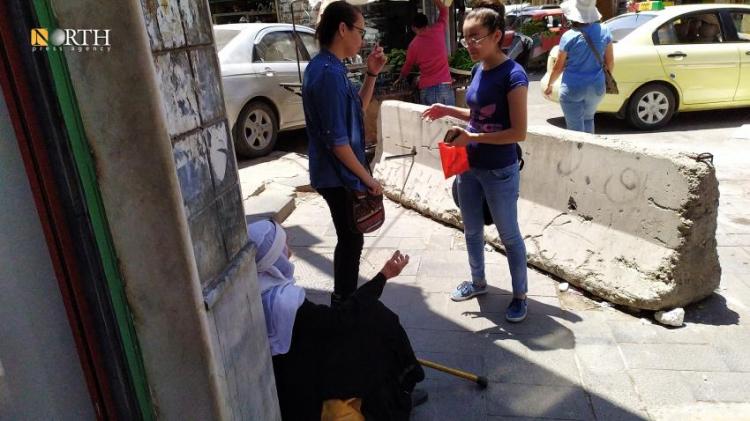SUWAYDA, Syria (North Press) – Begging among elderly men and women has increased in the streets of Suwayda, south Syria, recently. However, specialists agree that this phenomenon is due to the Syrian crisis, family disintegration, loss of breadwinners, and the lack of interest of institutions concerned with caring for the elderly in the governorate.
Masod Harb, the owner of a clothing shop in Omaya street in the city center, told North Press that the city is witnessing dozens of elderl men and women begging, some of whom are over the age of 60, “after we were suffering from child begging in the city."
He added that " they enter the shop asking for their daily bread with a bad psychological situation. I cannot keep myself from help them; sometimes I try to understand the reasons that pushed them to such a way."
62-year-old Hayel, a beggar in the city, said that his three sisters died and he has neither children nor a breadwinner "except God."
He added that "Some good people provided me with aid, but it did not last long. I cannot work because I have an eye illness and need care. I may go to an assisted living center for the elderly that may help me because I cannot bear the cruelty of life."
Akram Abu Omar, a doctor in Suwayda, said that circumstances of Syrian war and the deteriorating economic conditions of Suwayda residents, increased the number of beggars, “which requires solidarity of all local organizations and the rich to assist the elderly and preserve their dignity."
Director of Social Affairs and Labor in Suwayda governorate Boshra Jarboa told North Press that they have recently launched an initiative against child begging in the streets of the city. “We succeeded in cooperation with the Anti-Begging Committee, the Red Crescent, and internal security forces in Suwayda. 50 beggar children were recovered from the clutches of those who were operating and exploiting them, and they were arrested and referred to the judiciary.”
She added that since child begging cases have decreased, the city is seeing an increase in elderly beggars. "This is despite the supportive programs that organizations as well as the governmental and international directorates provided to people in need and elderly."
"Seeing an elderly beggar is something painful, some of them escaped from the elderly care centers because they are unable to adapt, psychological disorders or family issues such as being neglected by their families," Jarboa said.
There is an Elderly Care Center in Suwayda that was established in 2001 which includes a garden and 40 rooms with beds. The Syrian government also provides it with medical supplies through the medical clinic inside the centre. Moreover, a number of migrants send donations to the center.
The Druze community, under the guidance of Akl sheikhs, launched an initiative to help beggars and house them in homes that are funded from the endowment money of the community house, according to Bashar Abu Hamdan, director of the Office of Social Support of the House of the Druze Unitarian community.
Solana Abdul Samad, the director of Anti-Begging Committee formed by the governorate council of Suwayda, told North Press "We should find a solution to the elderly begging. Last week we and representatives of Social Affairs and Labor and the Red Crescent held a meeting in the Elderly Care Center to find a solution to the phenomenon."
She added that "beds and a shelter were prepared inside the center to receive begging cases that will be followed up in the coming days."

